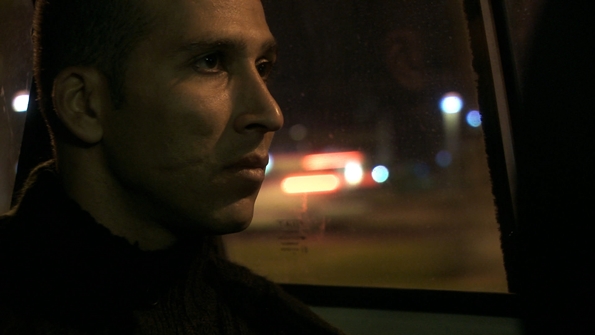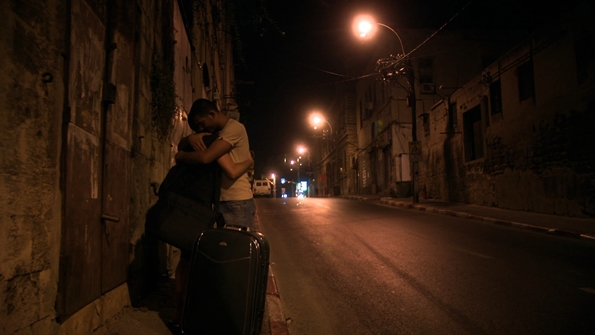
Louie is 32. He’s a good looking guy, trim, fashion conscious. When he smiles, it’s hard to tell if he’s being impish or if he’s just a little shy. A scar curves along his right cheek; he got it when his father slashed him across the face with a knife, Louie says.
Louie, the principal subject of Yariv Mozer’s affecting and effective documentary, The Invisible Men – winner of a Special Jury mention at the just-concluded DocAviv Documentary Film Festival – is trapped between two hostile worlds. A gay Palestinian from Nablus, his life is in danger, he says, if he remains in the Occupied Territories. But as a Palestinian without papers in Tel Aviv, he is constantly at risk of being picked up and summarily deported as a security risk. Tel Aviv is more sympathetic than the West Bank; but he has no home and no chance of making a home here. So he flits in the shadows, hoping for the best.
Mozer is a sympathetic, often unintrusive presence in the film, too committed to the cause to be detached but sensible enough to allow the story to evolve without overt interpretation or exposition on his part. Louie hails a taxi for a night time ride through Jaffa; he does it so he can feel the Arabic vibes that he misses from the other side of the Green Line. But he dare not walk through the streets because he has family there, family who may do him harm. Whilst waiting for a bus, he fingers the Star of David that hangs round his neck like a protective amulet. It is, in a manner of speaking; it’s intended to give him the powers of invisibility.
The Invisible Men revolves around an existential dilemma: to stay or to go. As a homosexual in fear of persecution, the possibility exists for Louie to seek asylum in Europe. It will provide safety, security. But it will be far far away from the things that mean the most to Louie. It is a seemingly intractable dilemma: for all the fear and anxiety, Tel Aviv has become something of a home for Louie over 8 years – albeit a home punctuated with enforced periods of absence, thanks to the Border Guard. It’s not a secure base, but it is the next best thing. Unstated, but always implicit, are the political complexities that mean that a land that he has an ancestral connection with cannot be his home. But then, the place of his immediate geographical origins remains forbidden to him too. It’s a cruel irony.

Mozer frames Louie’s dilemma with the differing experiences of two other homosexual Palestinians from the occupied territories. Abdu is 24, an extrovert and more worldly than Louie. They meet through the services of the NGO that works with people in their position, seeking sanctuary elsewhere. Abdu is better connected to the underground gay Palestinian scene in Tel Aviv, and reveals to Louie a supportive world that he had not imagined existed hitherto. But Abdu is on his way out. His papers have come through, and even though he has more to give up than Louie – friendship, fraternity – he has already made the break in his mind. Ramallah is so close, yet so far away, and Tel Aviv will never fully be his home. So he is off to seek a new life in Europe, far away. Then there is Faris, 23, on the run from his family. He speaks English but not Hebrew, and is hiding in Ramallah. It’s no way to live. The only option, challenging as it will be, will be to cross the border…
Despite the powerful political undertones, The Invisible Men is first and foremost a very personal film. There are no big heroes or villains, rather ordinary people caught out by extraordinary circumstances. It’s easy to bandy about words like dignity and humility when thinking about Louie as he navigates the emotional and physical boundaries that circumscribe his life. He is these things, but the film isn’t about this. We, the viewer, never feel the need to feel sorry for him; we just want him to succeed, however best he can.
One other thing: Pinkwashing is a relatively new addition to the lexicon of the endless Middle East conflict. Essentially, it is the proposition that the Israeli government and it’s noisier supporters use the rights enjoyed by the gay community as a fig leaf to obscure its actions elsewhere – look how good we are to the gays, and look how horrible the others are, essentially. There is some truth in this: for one thing, the Israeli government presumably enacts human rights legislation as a means of protecting its own population, rather than to show up the frailties that exist in neighboring countries, one hopes. And, lest we forget, several of the coalition partners of the current government would cheerfully roll back the protective legislation that does make Israel a uniquely welcoming haven for sexual equality in the Middle East.
It would be easy to suggest that The Invisible Men falls within a grand strategy of Pinkwashing; it’ll also be pretty lazy. The Invisible Men scrupulously refuses to take sides in the complicated matters that inform citizenship and nationality in Israel. What you see is what you get; no one comes out of the affair looking particularly good. The currency of Truth need not get involved in partisan affairs. And, like it or not, the film is about one man’s very personal truth.






To ANY LGBT refugee that can make it to the United STates we live in Indianapolis Indiana and offer our PRIVATE spare bedrooms with bathrooms and cable tv. The time to stay with us is limited but we promise to network and get you help, work, food and shelter. If your LGBT in the United States or any other part of the world and can offer these same easy services please do so. Please feel free to ADD me on FB and call me (317) 701-7180
Comments are closed.